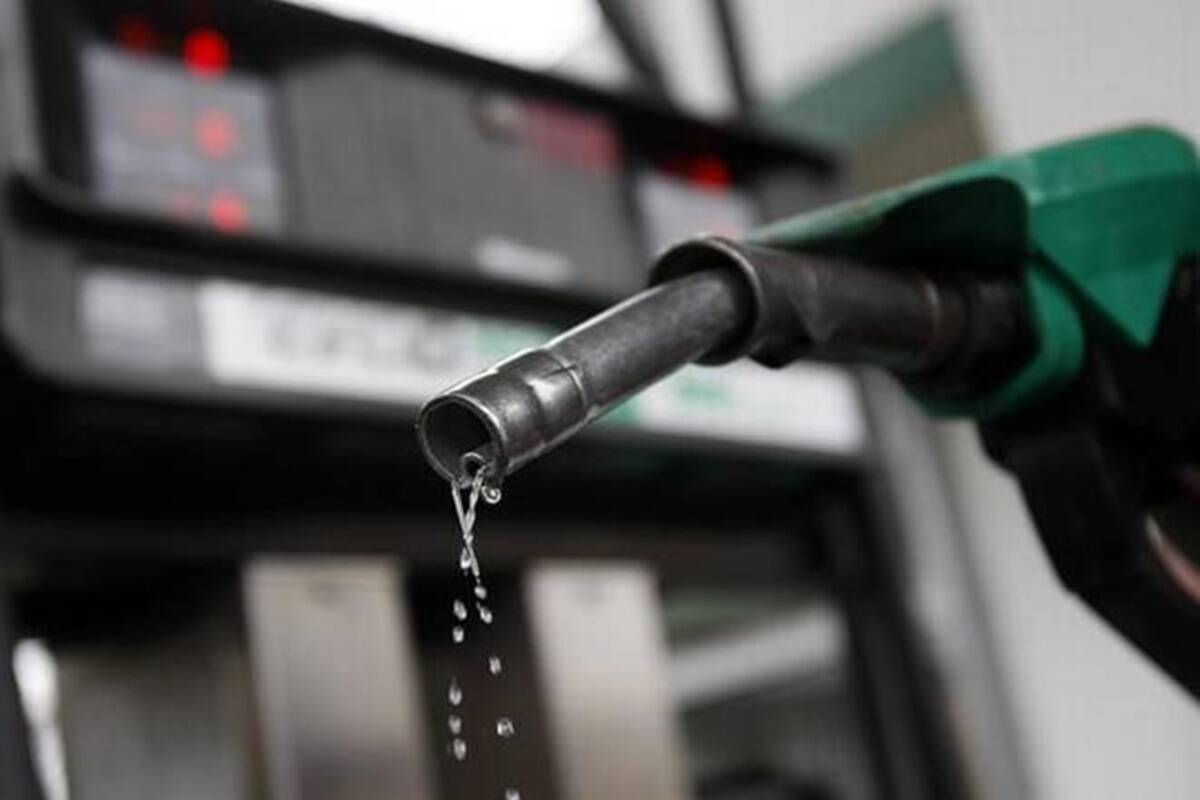The federal government on Thursday said spending over N100 billion to subsidise petrol every month is not sustainable.
The Group Managing Director of Nigerian National Petroleum Corporation (NNPC), Mele Kyari, said petrol is currently being subsidised at between N100 billion and N120 billion on a monthly basis.
- Shoot them or talk to them? What Nigeria must do with its bandits
- Nigeria yet to exit recession — KWACCIMA
Kyari disclosed this while fielding questions from State House correspondents at the fifth edition of the Special Ministerial Briefings coordinated by the Presidential Communication Team.
This is even as he said the cost of importation and handling charges now amounts to N234 per litre.
The contention surrounding government intervention in the procurement and distribution of petrol for local consumption attracted different names from 2015, including under recovery.
Analysts believe that while the interventions were plagued by secrecy, Nigeria will never get it right until its refineries become functional to channel generated revenues to other critical sectors.
What Kyari said
The NNPC GMD said the corporation could no longer bear the burden of the product currently being sold at N162 per litre.
He spoke after the Minister of State for Petroleum Resources, Timipre Sylva, had briefed on the efforts to ensure the passage of the Petroleum Industry Bill (PIB).
Kyari, who said NNPC currently absorbs the cost differential which is recorded in its financial books, revealed that while the actual cost of importation and handling charges amounts to N234 per litre, the government is selling at N162 per litre.
He said market forces must be allowed to determine the pump price of petrol in the country but was silent on when the regime will take off.
He, however, added that the government was being considerate of the actual impact of the price increase on Nigerians.
While speaking on the exact amount the NNPC is subsidizing fuel monthly, he said: “Our current consumption is about N600 million litres per day; we are selling at N162 per litre and the current market price is N234; actual market price today.
“The difference between the two multiplied by 60 million times 30 will give you per month.
“I don’t have the numbers now, this is simple arithmetic we can do; but if you want the exact figures from our books, I do not have it this moment, but it is anywhere between N100 billion to N120 billion per month. I don’t have the exact number.”
Kyari added: “Today, NNPC is the sole importer of fuel. We are importing at market price and we are selling at N162. Looking at the current price situation, the market price could have been between N211 to around N234 per litre.
“The meaning of this is that the consumers are not paying for the full value of the PMS (petrol) that we are consuming and therefore the NNPC is bearing that cost.
“That is why early last year, you will recall the full deregulation of PMS and we have followed this through until September when the price shifted above N145.
“Disputes came up between us and the trade unions and the civil societies leading to an engagement between us and organised labour which prevented the implementation of the actual price of the petroleum product as at that time.
“These engagements continued and the objective of the engagement is actually not to prevent the implementation, but to make sure there is sufficient framework on the ground to ensure that consumers pay the actual price of this product and that they are not exploited.
“Secondly, (it is) to also put some relief such that the potential effects of the fuel price increase are not transferred to the ordinary people. Part of this is to deepen the auto-gas programme.
“With the auto-gas programme, we will be able to deliver alternative fuel for vehicles, including Keke Napep, so that the price per litre equivalent will probably be half of the PMS at its current price.”
Nigerian fuel in neighbouring countries
Engr. Kyari said petrol remains cheapest in Nigeria on the ground that it sells above N200 across our borders and in some places about N500 a litre.
“In some countries, the Nigerian fuel is their territory’s fuel and we are supplying almost everybody in the West African region.
“We cannot continue to afford this because we have our own issues.
“That is why the eventual exit from this is completely inevitable. When that will happen, I don’t know.
“But I know that some engagements are going on; the government is concerned about the natural impact of price increase on our transportation and other consumer aspects of our society.”
Labour set for mass action
Organised Labour has charged Nigerians to join forces with the Nigeria Labour Congress, Trade Union Congress and all its affiliates for mass action if government tampers with the current pump price which is already at N162.
President of NLC Ayuba Wabba, in an interview with Daily Trust, maintained that Nigerians can no longer bear any increase in pump price because of geometric increase of unemployment and inflation rate.
He stated: “At this point in time, Nigerians cannot accommodate any price increase or fluctuation because already, many Nigerians have been impoverished occasioned by COVID-19 and economic downturn. We just came out of recession.
“Importantly, we have seen the statistics on unemployment and inflation. It means those statistics will be doubled if we go in that direction.
“The primary purpose of government is to continue to make sure that citizens don’t suffer the consequences of what they have not bargained for.
“As we speak, with the increment in tariff, energy is still being subsidized. We have shared that document very widely – a commission report by the NLC.”
When asked about the labour’s next line of action if the government goes ahead to actualise its plan, Wabba said, “Our position is very clear, once that happens, certainly we are going to consult our people to know the next line of action.
“Once it reaches the level of going for a showdown, we will consult our organs and roll out what we need to engage them on.”
Responding to a question about Nigerians’ expectation from the labour, the union leader said, “Nigerians should also come out and join labour to resist it. We, the labour leaders are part of Nigerian society.”
FG must come out clean on deregulation – Experts
Speaking on the back and forth over fuel subsidy, the Managing Director of Kairos Capital, Sam Chidoka, said, “I think the challenge is lack of clarity arising from some form of opaqueness in the pricing of PMS.
“At some point, they told us that they had completely removed subsidy; at another time, they told us that not all of it was removed.
“If we fully implement complete subsidy removal, then petroleum products will be priced differently across the nation when you factor the cost of haulage but this government is still funding equalization, so there is a lot to be explained.”
Chidoka further argued that with the recent increment in electricity tariff and the devaluation of the naira to the dollar, and inflation trending at 17 per cent, any upward movement in the price of petrol will further impoverish the masses.
The Director-General of Lagos Chamber of Commerce and Industry (LCCI), Dr Muda Yusuf, said, “The increasing burden of petroleum subsidy is an offshoot of the deregulation conundrum which is a major cause for concern.
He noted that the deregulation of the petroleum downstream sector was inevitable if the economy must progress and put an end to the corruption that comes with the subsidy regime.
Talking on the way forward, he said, “There could be a social pricing window in the interim where petroleum products could be sold at a subsidized price.”
“The NNPC stations could be so designated since they exist in all parts of the country. The government will have to provide a limited budget for this.
“The other players in the sector should thereafter be allowed to buy and sell according to the dictates of the market. We need to free the sector from the current repressive and suffocating regulatory framework.
“The economy has suffered major setbacks as a result of the over regulation of the sector.”
An Abuja-based economic expert, Simon Samson Galadima, said it was good that NNPC admitted it had been paying subsidy long after the FG said it had deregulated the sector.
“The FG saying subsidy has been removed is just a ruse. We have said it before, that the claim of deregulation is just a ploy.
“That the GMD was conceding it publicly is the right thing to do; to accept you have a problem before you can fix it.
“The billions spent on subsidy are better used to tackle insecurity, build schools, boost science/technology, equip hospitals and better invested in infrastructure and innovation,” he said.
He maintained that the government-owned refineries should be sold off or commercialised. On his part, an energy expert, Michael John, said Nigeria was paying a huge price for not being responsive.
“Had our leaders made good use of our oil fortune, we wouldn’t have been in this mess; we wouldn’t have been talking about subsidy if we have our refineries.
“The so-called subsidy money would have been used to provide basic necessities for people like water and good roads.
“That said, the federal government should find a way of refining the oil at home in order to free funds for critical infrastructure because, at present, Nigerians do not have the purchasing power to live because, without fuel subsidy, prices of everything will skyrocket,” he said.
N120bn enough to fund many projects
Daily Trust reports that the N120bn monthly subsidy on petrol is higher than the 2021 budget of Yobe (N106.9bn) or the N109bn budget for Osun, or the N109.6bn earmarked by Ekiti State.
On what the N120bn subsidy fund can do every month, it is estimated that at N22 million for a unit of a primary healthcare centre (PHC) provided by the National Primary Healthcare Development Agency (NPHDA) as of 2017, the fund can build 5,500 units of such facilities with the 36 states and the Federal Capital Territory (FCT) getting 151 units each.
40,000 housing units
The Federal Mortgage Bank of Nigeria (FMBN) in 2019 said Nigeria has a 22 million housing deficit.
The Low-Cost Housing being developed across the states by the Federal Ministry of Works and Housing goes for N3m per block of a two-bedroom flat. The N120bn subsidy fund can build 40,000 units of these houses.
Cut classrooms deficit by 15.5%
The Universal Basic Education Commission (UBEC) can vote N120bn of this fund to build 8,500 blocks of four classrooms which will make available, a record 35,000 classrooms.
UBEC places the cost of building a block of four classrooms at N13.5m.
By Muideen Olaniyi, Zakariyya Adaramola, Simon E. Sunday, Idowu Isamotu, Faruk Shuaib (Abuja) & Sunday M. Ogwu (Lagos)

 Join Daily Trust WhatsApp Community For Quick Access To News and Happenings Around You.
Join Daily Trust WhatsApp Community For Quick Access To News and Happenings Around You.


